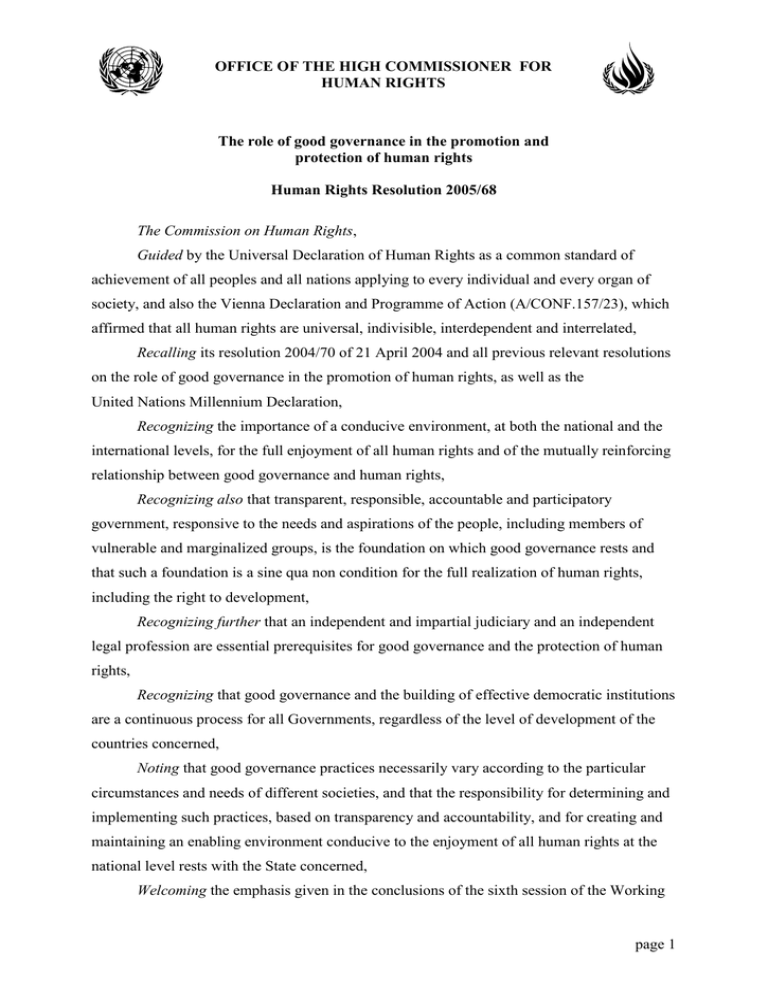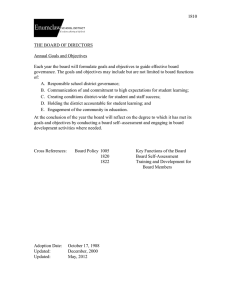OFFICE OF THE HIGH COMMISSIONER FOR HUMAN RIGHTS
advertisement

OFFICE OF THE HIGH COMMISSIONER FOR HUMAN RIGHTS The role of good governance in the promotion and protection of human rights Human Rights Resolution 2005/68 The Commission on Human Rights, Guided by the Universal Declaration of Human Rights as a common standard of achievement of all peoples and all nations applying to every individual and every organ of society, and also the Vienna Declaration and Programme of Action (A/CONF.157/23), which affirmed that all human rights are universal, indivisible, interdependent and interrelated, Recalling its resolution 2004/70 of 21 April 2004 and all previous relevant resolutions on the role of good governance in the promotion of human rights, as well as the United Nations Millennium Declaration, Recognizing the importance of a conducive environment, at both the national and the international levels, for the full enjoyment of all human rights and of the mutually reinforcing relationship between good governance and human rights, Recognizing also that transparent, responsible, accountable and participatory government, responsive to the needs and aspirations of the people, including members of vulnerable and marginalized groups, is the foundation on which good governance rests and that such a foundation is a sine qua non condition for the full realization of human rights, including the right to development, Recognizing further that an independent and impartial judiciary and an independent legal profession are essential prerequisites for good governance and the protection of human rights, Recognizing that good governance and the building of effective democratic institutions are a continuous process for all Governments, regardless of the level of development of the countries concerned, Noting that good governance practices necessarily vary according to the particular circumstances and needs of different societies, and that the responsibility for determining and implementing such practices, based on transparency and accountability, and for creating and maintaining an enabling environment conducive to the enjoyment of all human rights at the national level rests with the State concerned, Welcoming the emphasis given in the conclusions of the sixth session of the Working page 1 Group on the Right to Development to the importance of good governance at all levels in the implementation of the right to development, Welcoming also the commitment of Arab States to national implementation of the Initiative for Good Governance for Development in the Arab Countries launched by them at the Organisation for Economic Co-operation and Development/United Nations Development Programme Conference on Good Governance for Development in the Arab Countries held in Amman on 6 and 7 February 2005, Recognizing the importance of an active civil society in ensuring that good governance practices benefit all people, including members of vulnerable and marginalized groups, Recognizing also the constructive role that national human rights institutions can play in promoting good governance, as reflected in the concluding statement and recommendations of the International Round Table on National Institutions and Governance, held in Suva from 13 to 15 December 2004, Reaffirming the leading role played by the United Nations in developing and promoting democracy and human rights, and recognizing the role of other processes, including the International Conference of New or Restored Democracies and the Community of Democracies, Reaffirming also the importance of international and regional cooperation, when required by the States in need, in order to facilitate the implementation of good governance practices at all levels, 1. Urges States to provide transparent, responsible, accountable and participatory government, responsive to the needs and aspirations of the people, including members of vulnerable and marginalized groups, and to respect and protect the independence of judges and lawyers in order to achieve the full realization of human rights; 2. Reaffirms the special role of good governance within countries and at the international level in development and poverty eradication, as reflected in paragraph 13 of the United Nations Millennium Declaration, and underlines its fundamental importance to the realization of the internationally accepted development goals, including those included in the Millennium Declaration; 3. Encourages, in this context, the growing recognition of the value of partnerships among relevant actors at all levels as a solid foundation on which good governance rests, and notes that such partnerships are strengthened by, inter alia, constructive approaches to international development cooperation; 4. Welcomes the report on the seminar, jointly organized by the Office of the page 2 United Nations High Commissioner for Human Rights and the United Nations Development Programme, on good governance practices for the promotion of human rights which took place in Seoul on 15 and 16 September 2004 and notes the discussions held on each of the four themes considered at the seminar, including: (a) The need for human rights education, including training of judges and lawyers and active law reform programmes to ensure that the rule of law promotes justice for all, including members of vulnerable and marginalized groups; (b) The need for Governments to ensure that services are delivered to all members of the public in a transparent and accountable manner that is adapted to the particular needs of the population and promotes and protects human rights; (c) The importance of deepening democracy beyond free and fair elections, to include other elements essential to the development of a truly transparent, responsible, accountable and participatory government; and (d) The importance of taking measures, both within countries and at the international level, that promote transparency and combat corruption, including entry into force and implementation of the United Nations Convention against Corruption as well as the United Nations Convention against Transnational Organized Crime, so as to eliminate corruption and the multiple negative impacts that it has on human rights; 5. Requests the Office of the United Nations High Commissioner for Human (a) To ensure relevant United Nations agencies and other bodies with governance Rights: programmes, including relevant international financial and development institutions, are aware of the outcomes of the seminar, and to encourage them to examine whether their approaches to good governance promote human rights; (b) To publish a selection of practices arising from the seminar and the material provided by States, intergovernmental organizations and non-governmental organizations, for consultation by States; (c) To convene a seminar in 2006, from extrabudgetary resources, on the role of anti-corruption measures at the national and international levels in good governance practices for the promotion and protection of human rights; 6. Decides to continue its consideration of this question at its sixty-second session under the same agenda item. 59th meeting 20 April 2005 page 3 [Adopted without a vote. See chap. XVII, E/CN.4/2005/L.10/Add.17] page 4


